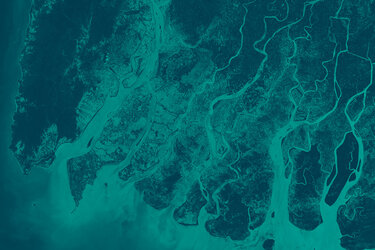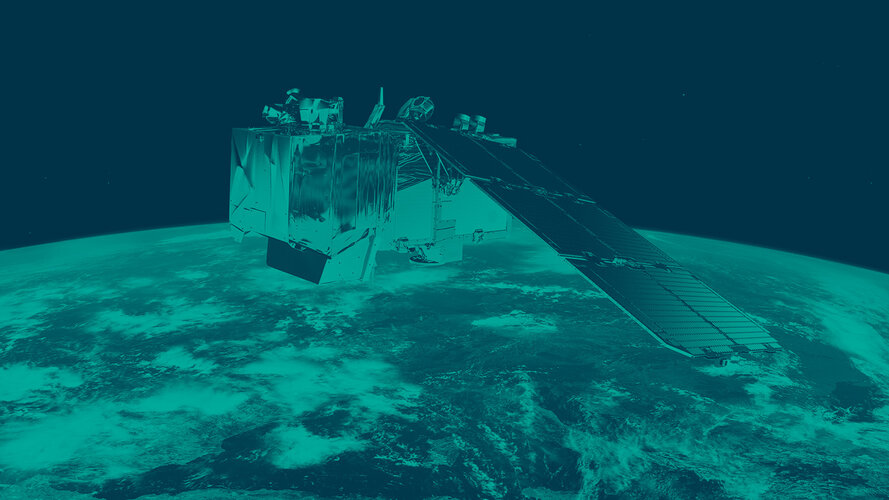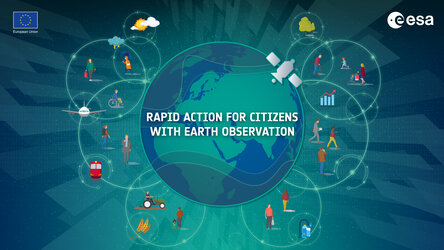Parking in a pandemic
The coronavirus pandemic has brought the tourism and travel industry to a near-standstill, with nationwide lockdowns significantly impacting the aviation and maritime industry worldwide. Satellite images, captured by the Copernicus Sentinel-2 mission, show parked aircraft and anchored vessels in times of COVID-19.
Global aviation is facing its battle to survive, with most flights grounded since March owing to travel restrictions in place to contain the coronavirus pandemic. According to aviation industry researcher Cirium, the number of passenger jets in service is the lowest it has been in 26 years.

Managing large-scale storage poses a challenge for the industry, as airlines hunt for space on the ground for storage facilities. Taxiways, hangers and even runways at major airports around the world are being transformed into parking spaces for planes. These images captured by the Copernicus Sentinel-2 mission show the numerous parked planes on runways – even in remote airports such as Alice Springs in Australia.
Airport storage facilities are sometimes referred to as ‘boneyards’ owing to airlines sending retired aircraft to the desert. These boneyards are often located in dry and arid places as the climate means planes can be preserved in excellent condition before returning to service or being reused.
Teruel Airport in the Aragon region in Spain was built with this purpose in mind. According to a recent report in Reuters, the airport is hosting around 100 aircraft and the number of planes arriving per week to be parked in the airport has doubled since the start of the global pandemic.
Another sector heavily affected by the pandemic is the cruise ship industry. Major cruise lines have suspended operations to mitigate the spread of COVID-19. Cruise ship operators around the world have struggled to find open ports to disembark, while some were forced to stay anchored at sea for an extended period of time.
Manila Bay, in the Philippines, has been transformed into a parking lot for cruise ships. In this animation, around 20 vessels can be seen anchored off the coast of Manila Bay. Captured by the Copernicus Sentinel-2 mission, this animation contains a sequence of images captured on 22 April, 2 May and 22 May 2020.

According to Reuters, the cruise ships have been asked to wait in the Manila Bay anchorage area with hundreds of seafarers remaining on board awaiting clearance in order to return home. The famous Diamond Princess and Ruby Princess vessels are said to be among the fleet.
In order to learn more about space applications and the socio-economic impact of COVID-19, ESA and the European Commission recently unveiled the new ‘Rapid Action Coronavirus Earth observation’ dashboard, also known as RACE. The platform uses Earth observation satellite data to measure the impact of the coronavirus lockdown worldwide, and monitor post-lockdown recovery.
About the Copernicus Sentinels
The Copernicus Sentinels are a fleet of dedicated EU-owned satellites, designed to deliver the wealth of data and imagery that are central to the European Union's Copernicus environmental programme. The European Commission leads and coordinates this programme, to improve the management of the environment, safeguarding lives every day. ESA is in charge of the space component, responsible for developing the family of Copernicus Sentinel satellites on behalf of the European Union and ensuring the flow of data for the Copernicus services, while the operations of the Copernicus Sentinels have been entrusted to ESA and EUMETSAT.















 Germany
Germany
 Austria
Austria
 Belgium
Belgium
 Denmark
Denmark
 Spain
Spain
 Estonia
Estonia
 Finland
Finland
 France
France
 Greece
Greece
 Hungary
Hungary
 Ireland
Ireland
 Italy
Italy
 Luxembourg
Luxembourg
 Norway
Norway
 The Netherlands
The Netherlands
 Poland
Poland
 Portugal
Portugal
 Czechia
Czechia
 Romania
Romania
 United Kingdom
United Kingdom
 Slovenia
Slovenia
 Sweden
Sweden
 Switzerland
Switzerland






























